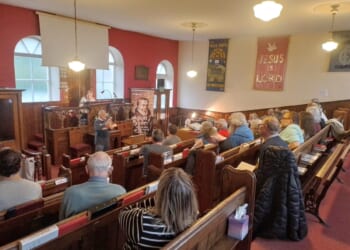Matthew Thomas is a member of the Royal Historical Society, and former Yorkshire Party Executive Committee member.
Understanding our national history and local heritage is not a nostalgic indulgence – it is a vital tool for shaping informed policy and preserving civic identity.
As Winston Churchill once said: “The farther backward you can look, the farther forward you are likely to see.”
Without a clear grasp of what came before us, we risk repeating past mistakes and fail to replicate past successes or appreciate the roots of our current challenges.
Historian Simon Schama once warned against the “self-inflicted collective memory loss” that comes from sidelining our own history, arguing that doing so undermines our ability to understand national identity and continuity. Similarly, Margaret Thatcher, a towering figure in Conservative politics – whose legacy I have only recently begun to really grapple with – believed deeply in the power of historical awareness.
She once said, “this is my faith; this is what I passionately believe; if you believe it too, then come with me,” which appears to me to have been a call to action rooted in conviction and historical understanding.
History is not static; it is a living dialogue between past and present, being ignorant or dismissive of our past will not halt the incessant march of time.
By studying our heritage, we gain the tools to evaluate change, preserve what matters, while embracing progress. In short, history is not just about where we have been, it is about where we are going. Sociologist Stuart Hall underscores the importance of historical understanding: “The task of the cultural theorist is not to demolish the past, but to understand how the past continues to live in the present.”
Hall’s insight speaks directly to the heart of the argument I present here. History is not merely a record of bygone events; it is a living force that shapes our identities, institutions, and societal debates. By understanding how historical narratives persist and evolve, we gain the clarity needed to craft policies that are both respectful of heritage and responsive to contemporary needs.
I am presenting this as a newly registered member of the Conservative Party, as the son of a retired coal miner, from the heart of Yorkshire’s coalfields, whose early years were forged in the fire of the 1984-85 coal miner’s strike.
The valley from where I hail included both Frickley Colliery and South Kirkby Colliery, amongst others, which naturally made the area militant, and a socialist stronghold. Tragically one young coal miner from the village of South Elmsall, David Jones, was killed during the events of the miners strike, leaving behind devastated small children, who (like me) left school to a desolate wasteland of hopelessness, economically.
One small bit of sage advice given to me by my grandfather, who passed away in his eighties, with his lungs and veins filled with coal dust: “Do not go under the ground, use your brains.” Not that I had much choice, in truth. I was the first member of my family to ever go to university, reading archaeology at the University of York, and this offered me the opportunity to travel to places I would never have dreamed of being able to go, such as East Africa.
It gave me perspective on my own heritage. I realised two important things, firstly that I did not really know the history of my people, and local heritage. And secondly that despite having a Labour MP since the dawn of time, local councils that often hand pick local Labour party members to fill casual vacancies, alongside a long period of Labour in national government, saw the only real ‘progress’ in my area as the replacement of coal mining with giant tin huts, facilitating the retail industry.
South Elmsall and South Kirkby, in this area, developed a culture of solidarity and self-reliance, especially during periods of economic hardship and industrial decline. These traits, while admirable, can sometimes be misinterpreted by outsiders as resistance to change, or wariness of newcomers. The perception of insularity often arises when communities like South Elmsall prioritise local traditions, maintain tight familial and social bonds, and show a preference for local institutions over external influences.
It can lead to a sense of “us and them,” particularly when outsiders bring unfamiliar cultural norms or expectations. Such communities are often deeply proud of their heritage and are equally deeply cautious about losing it in the face of forced change due to external policy decisions made by Government in London. However, this perceived insularity can also be a strength. It fosters resilience, loyalty, and a powerful sense of place, qualities that are increasingly rare in communities where people are more transient. Understanding this dynamic is key to bridging gaps between local and national perspectives, especially when designing policies that affect such communities.
In my spare time, with this newfound sense of local pride, I began to research and document the heritage of my forgotten corner of England – and herein I wish to give one specific example of how our history can and must inform us. Arthur Wharton was a pioneering figure whose life spanned continents, cultures, and careers. Born in 1865 in Jamestown, Gold Coast (modern day Ghana), he was the son of a Grenadian-Scottish Methodist missionary and a Fante royal.
Despite his royal birthright in Africa, Arthur moved to England to train as a Methodist minister and soon embraced a life in sport, becoming the world’s first black professional footballer, playing for clubs including Darlington, Preston North End, and Sheffield United, then a truly working-class sport. Arthur also excelled in sprinting, equalling the world record for the 100-yard dash in 1886, and competed in cycling and cricket, often playing for the colliery teams where he was employed.
At one point in his life, Arthur and his wife settled into an anonymous terraced house in Moorthorpe, a village sandwiched between South Elmsall and South Kirkby. Despite his royal lineage and his sporting fame, Arthur struggled financially, often taking in lodgers and he developed a love of alcohol, truly embracing his adopted English heritage. His story is one of triumph and hardship, reflecting the complexities of race, class, and identity in Victorian and Edwardian Britain and demonstrates that these working-class northern towns and villages welcomed outsiders who assimilated.
In my capacity as a local historian – tasked with the burden of uncovering and preserving the forgotten faces and names from a bygone era – of an area of Yorkshire where societal decline appears to be accelerating out of control, through a mixture of failed Government policies and the sheer scale of mass migration to an area already buckling under the weight of decades of mismanagement, I tried in vain to rally support for a blue plaque scheme to recognise and celebrate those such as Arthur Wharton.
Sadly, local Councillors (almost entirely Labour), ignored my requests for support – and as local families leave the area, the incoming people replacing them have little time for supporting such initiatives. Clifford Street, where the unassuming terraced house that Arthur once called home is located, is a sorry sight today. The playground next door is dilapidated and often strewn with discarded drug paraphernalia, and is abutted by a graffiti covered closed pub, neither being of any much interest to the non-British born residents who now call the area home, many of whom have not integrated into local society.
This is made all the more shameful on the part of Labour, in that just two streets away is the former Moorthorpe Miner’s Institute: once the focal point of village life, and where such giants of Labour and national political life as the Lansbury family were regular visitors. That Labour could hold such areas with an iron fist for so many decades, and simply forget why these areas have been so loyal in their unending support for the Labour party is one thing – that Labour have been so dismissive of large swathes of working class, largely far left communities such as these, ignoring the valid concerns of a loss of community cohesion and loss of proud heritage is even more shameful. Keir Starmer’s Government is only accelerating the flow of immigrants into such bewildered communities, who once welcomed outsiders as their own, but are now being branded as far right and worse by the powers that be.
It is my firm belief that it is paramount to the future of the United Kingdom, and to the Conservative Party, that Conservative leaders genuinely listen to the people Labour has abandoned. There has never been a better opportunity for the Conservatives to embrace the crumbling red wall – harnessing genuine fears about the pace of unfettered change, and proving to working class Britain that somebody is actually going to help preserve and recover the fabric of society being unpicked by Number 10. If someone such as myself can be won over by the Conservatives, and take the time to issue a rallying cry to fellow Conservatives to campaign hard in the red wall areas where a decade ago I would have had locals laugh in my face for daring to even posit such an idea, anything is possible.





![Gavin Newsom Threatens to 'Punch These Sons of B*thces in the Mouth' [WATCH]](https://www.right2024.com/wp-content/uploads/2025/08/Gavin-Newsom-Threatens-to-Punch-These-Sons-of-Bthces-in-350x250.jpg)
![ICE Arrests Illegal Alien Influencer During Her Livestream in Los Angeles: ‘You Bet We Did’ [WATCH]](https://www.right2024.com/wp-content/uploads/2025/08/ICE-Arrests-Illegal-Alien-Influencer-During-Her-Livestream-in-Los-350x250.jpg)








